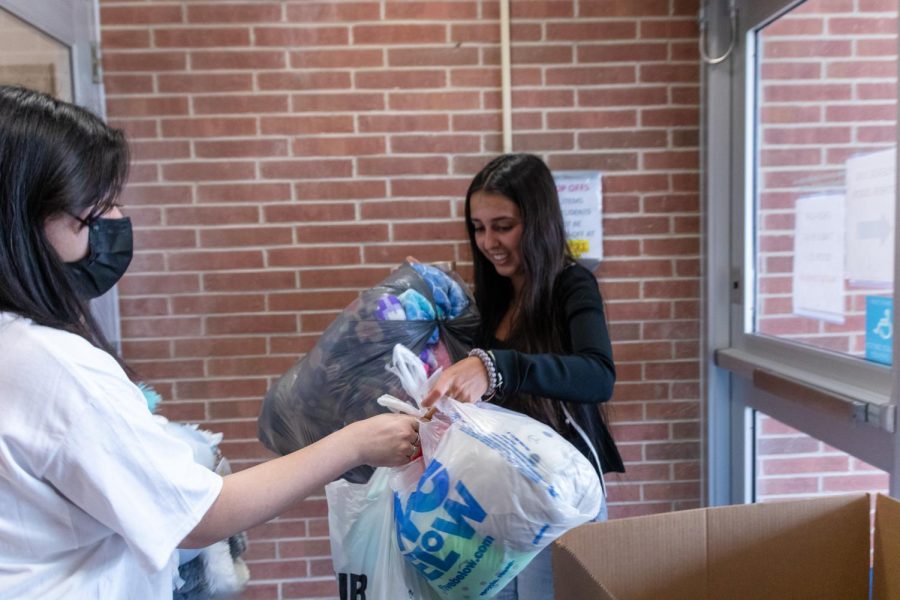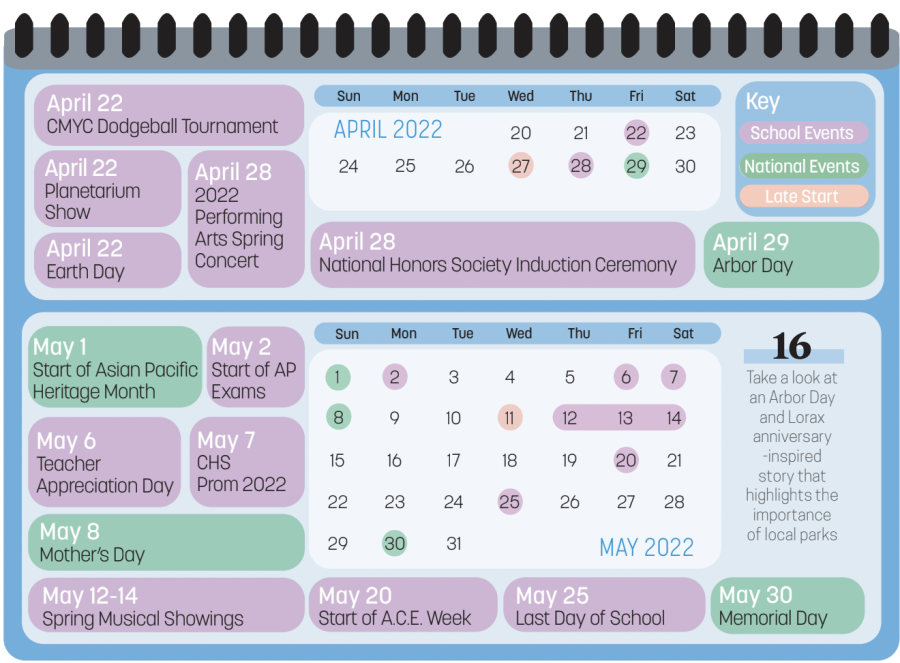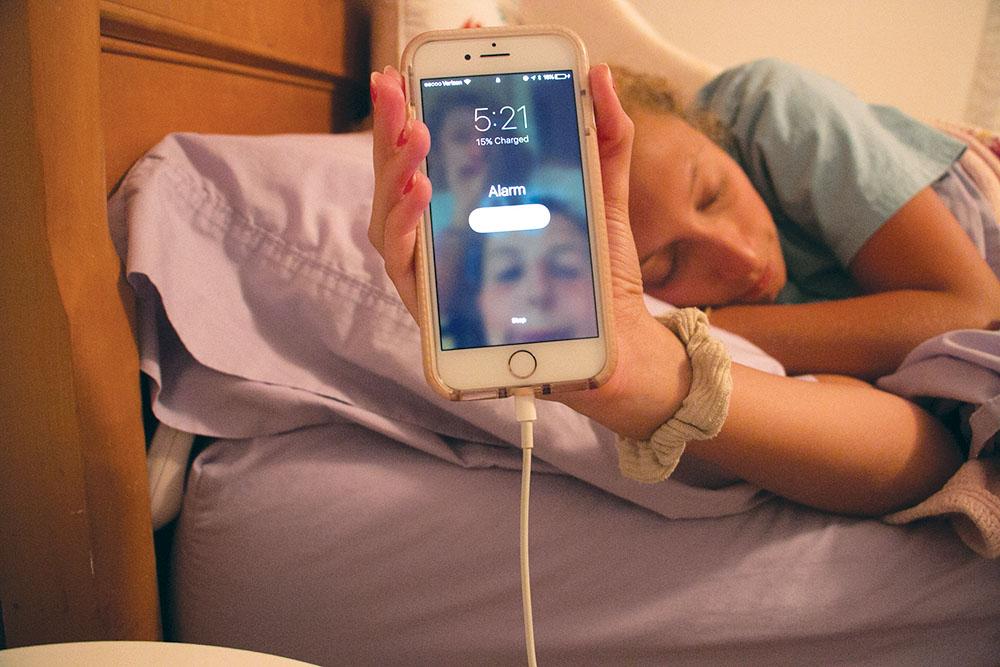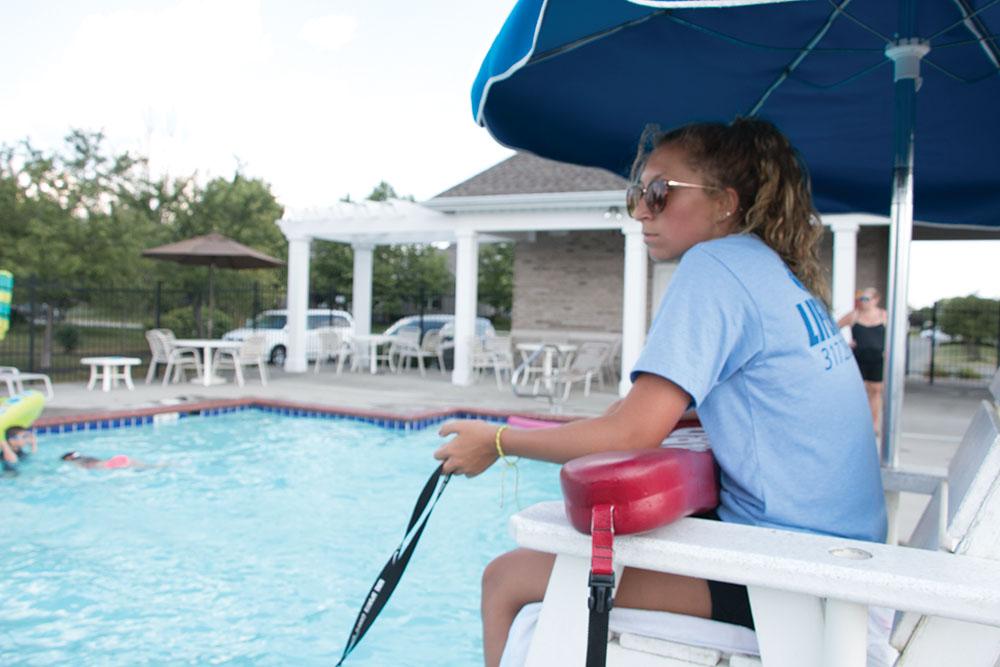In recent years, more and more researchers have published studies supporting the stance that high schools should indeed start later. The focal point of these studies is the idea that teenagers just aren’t getting enough sleep.
According to a recent National Sleep Foundation (NSF) study, 15 percent of teens reported sleeping eight and a half hours per school night, but the same study states the necessary hours of sleep teenagers need per night ranges from eight to 10.
For swimmer and junior Addi Milton, she said she is lucky to receive even six hours.
“My sleep schedule is not very regular because of swimming. On swimming days when we have to wake up super early, I have to wake up at (around) 4 a.m. and then I’m (at school) until 5:40 p.m.,” Milton said.
Furthermore, she said this lack of sleep has taken a definite toll on her school work.
“During the winter when the season is really hard and we have swim meets that will go until 10 p.m. during the week and we have to get up in the morning to go to practice, we’ll stay up until 2 a.m. studying, and we’ll have to get up at 4 a.m., so it definitely affected my performance on tests and other school work,” Milton said.
Milton’s situation is not an isolated incident. Senior MinHua Li said she experiences the same predicament despite getting, on average, eight hours of sleep a night because of extracurricular activities and a heavy course load.
“It feels like, no matter how much sleep I get, it’s not enough, especially in the morning. Since we’re in the school for over six hours, it takes a lot of your brain energy and then you have so much homework to do. And when you finally go to sleep, you’re really exhausted so you just collapse,” Li said. “Then in the morning, you have to wake up really early. It’s really hard on my morning classes…It’s really hard to pay attention.”
Science teacher Erin Odya, however, said sleep deprivation affects much more than just attention span; it affects the body and memory, notably the conversion of short-term to long-term memory.
Odya said, “You first have to start by looking at the purpose of sleep. A lot of people think sleep is nothingness, and it’s just your body being put on pause and resting, and that’s not even close. So much happens…If you’re thinking about a typical school day, the things that you learned the day before didn’t go into long term memory, and then you’re tired during class so you’re not absorbing all of the information that’s there even if you are trying to pay attention.”
According to Nationwide Children’s Hospital, sleep deprivation affects students’ moods, behaviors and academic performance.
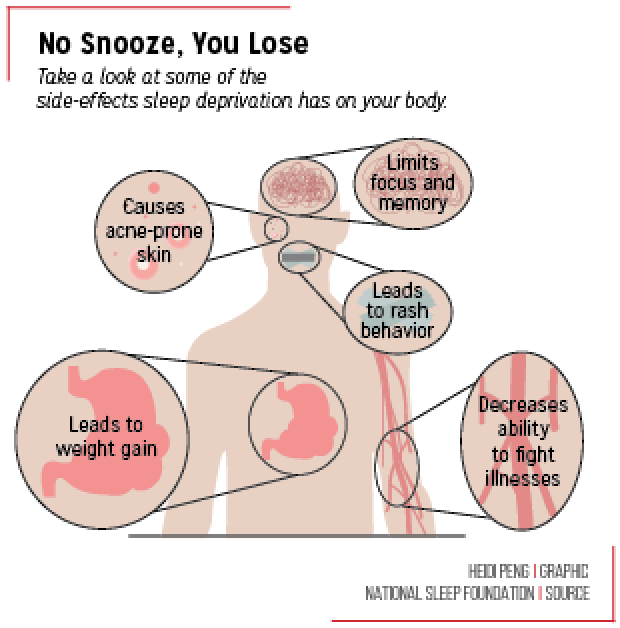
Moreover, English teacher Cristen Cassler said the early start time doesn’t just affect students; it also affects teachers, particularly those with children.
“As a teacher, especially with having a family and children that I have to get ready for school, I think it would be helpful to start school a little bit later. Especially at Carmel, we can’t drop our kids off until 7 (a.m.) and I have to be here by 7:30 (a.m.); it’s a really quick and tight morning that we have,” Cassler said.
Nevertheless, Cassler said she believes there are more drawbacks to starting school later than advantages.
She said, “I think that (starting school later) would be a huge thing to change with the logistics that go into it like busing and (coordinating) with the elementary schools…I think there are just a lot of moving pieces that it would be hard to get that change to go.”
Odya said she also agrees that shifting the start time would prove too difficult in the long run.
“It’s a trade off. It would make the mornings a lot better; who doesn’t want to sleep in? But then the after school becomes the big issue there…When you look at all the extracurriculars, they are all starting an hour later,” Odya said. “You start later so that (teenagers) can sleep longer, (but) say that we start an hour later, you guys lose an hour of homework time in the end.”
In addition, Milton said she believes it wouldn’t help her get more sleep anyway. “I feel like I would probably be just as tired because, even though we’re starting school later, I would end up going to bed later because I would be (at school) practicing later. I think it would be remotely the same amount of sleep that I (get now),” Milton said.
Moreover, according to Milton, as the school year goes on, she said she believes dealing with the early start time becomes much easier and almost routine.
“It’s definitely a lot harder at the beginning of the year and the beginning of the season in the fall to wake up early, but during the middle of the winter…it’s routine,” she said. “You know you’re going to get up early; you know you’re going to have to be here until 6 p.m. It’s my kind of normal.”
According to the NSF, the best ways to combat sleep deprivation are making sleep a priority and setting up a regular sleep schedule.
For Li, she said by making sleep a priority for her, she has seen a palpable boost in her cognitive capacity.
She said, “I’ve gotten used to it. (During), my sophomore year, (it) was really bad; I usually went to bed at around 11 p.m. But (last year), since I started to notice that I was dozing off or missing lectures in class, I started going to bed earlier, and I tried to be in bed before 10 p.m. I think it really helped because now I pay more attention in class.”
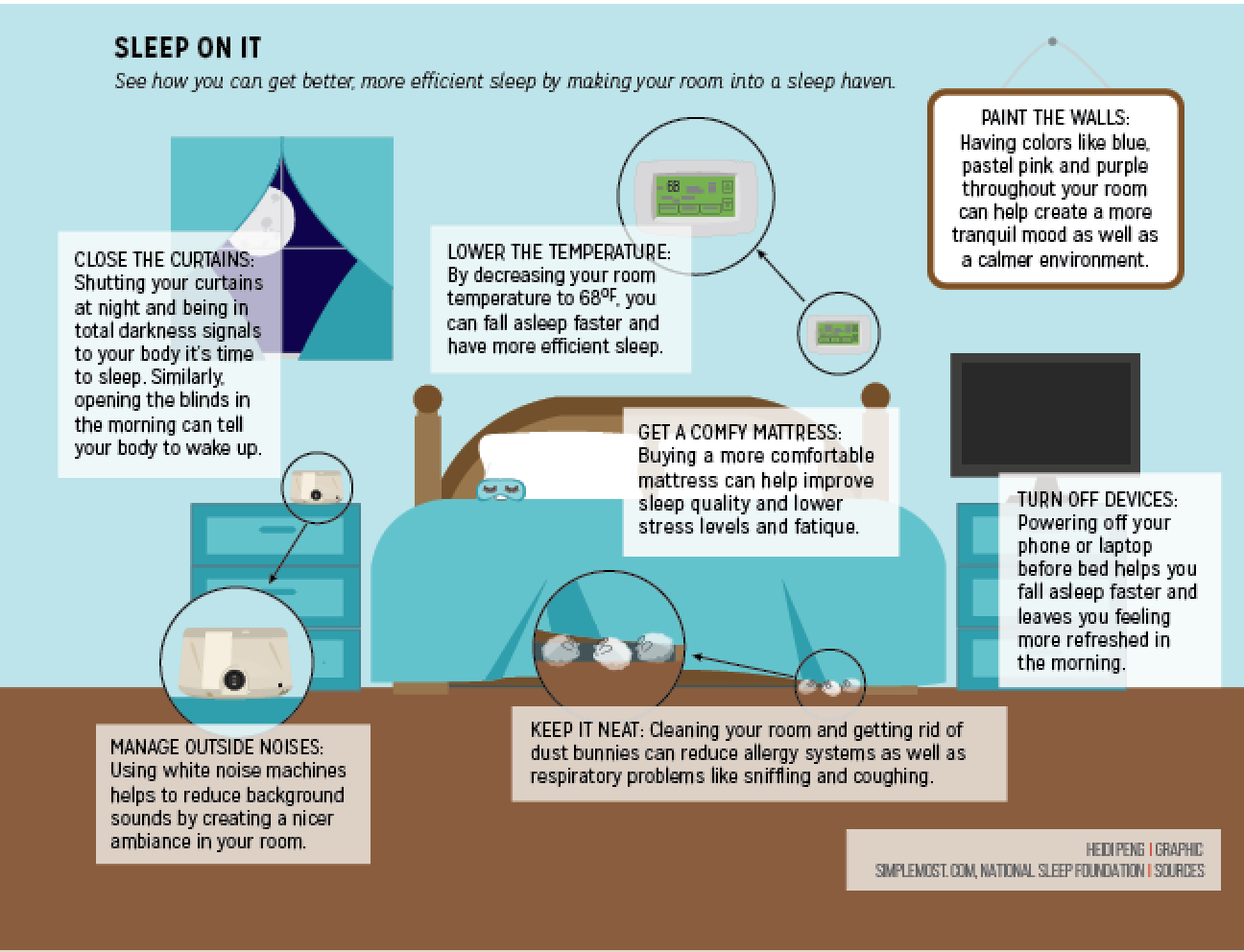
According to Odya, in addition to having a regular sleep schedule, one must also evaluate the quality of sleep in relation to quantity.
Odya said, “Quality is more important than quantity for sure. Quantity differs for different people…Some people can get through (sleep cycles) very quickly, so you’ll see people who are totally fine on four or five hours of sleep a night. Most people need a least six (hours) to get through all their cycles.
“(And) you can’t make up sleep. Say you stay up studying all night, you cannot then sleep all the next day or two days later and catch up on sleep; that’s not possible. A regular sleep schedule is more important than total hours.”
Ultimately, Li said it’s all up to each individual student and how much they value sleep in comparison to school work.
“It’s their choice if they want to stay up and get homework done,” Li said. “But my personal philosophy is that even if I don’t get all of my studying done, I’ll still turn in for the night because I know that in the long run, it’s going to be more beneficial to me.”


































![British royalty are American celebrities [opinion]](https://hilite.org/wp-content/uploads/2024/03/Screenshot-2024-03-24-1.44.57-PM.png)


















![Review: “Suits” is a perfect blend of legal drama and humor [MUSE]](https://hilite.org/wp-content/uploads/2024/04/unnamed-1.png)
![Chelsea Meng on her instagram-run bracelet shop [Biz Buzz]](https://hilite.org/wp-content/uploads/2024/04/IMG_2446-1200x838.jpg)
![Review: Quiet on Set: The Dark Side of Kids TV is the long awaited exposé of pedophilia within the children’s entertainment industry [MUSE]](https://hilite.org/wp-content/uploads/2024/04/unnamed.jpg)
![Review: “The Iron Claw” cannot get enough praise [MUSE]](https://hilite.org/wp-content/uploads/2024/04/unnamed.png)
![Review: “The Bear” sets an unbelievably high bar for future comedy shows [MUSE]](https://hilite.org/wp-content/uploads/2024/03/unnamed.png)
![Review in Print: Maripaz Villar brings a delightfully unique style to the world of WEBTOON [MUSE]](https://hilite.org/wp-content/uploads/2023/12/maripazcover-1200x960.jpg)
![Review: “The Sword of Kaigen” is a masterpiece [MUSE]](https://hilite.org/wp-content/uploads/2023/11/Screenshot-2023-11-26-201051.png)
![Review: Gateron Oil Kings, great linear switches, okay price [MUSE]](https://hilite.org/wp-content/uploads/2023/11/Screenshot-2023-11-26-200553.png)
![Review: “A Haunting in Venice” is a significant improvement from other Agatha Christie adaptations [MUSE]](https://hilite.org/wp-content/uploads/2023/11/e7ee2938a6d422669771bce6d8088521.jpg)
![Review: A Thanksgiving story from elementary school, still just as interesting [MUSE]](https://hilite.org/wp-content/uploads/2023/11/Screenshot-2023-11-26-195514-987x1200.png)
![Review: When I Fly Towards You, cute, uplifting youth drama [MUSE]](https://hilite.org/wp-content/uploads/2023/09/When-I-Fly-Towards-You-Chinese-drama.png)
![Postcards from Muse: Hawaii Travel Diary [MUSE]](https://hilite.org/wp-content/uploads/2023/09/My-project-1-1200x1200.jpg)
![Review: Ladybug & Cat Noir: The Movie, departure from original show [MUSE]](https://hilite.org/wp-content/uploads/2023/09/Ladybug__Cat_Noir_-_The_Movie_poster.jpg)
![Review in Print: Hidden Love is the cute, uplifting drama everyone needs [MUSE]](https://hilite.org/wp-content/uploads/2023/09/hiddenlovecover-e1693597208225-1030x1200.png)
![Review in Print: Heartstopper is the heartwarming queer romance we all need [MUSE]](https://hilite.org/wp-content/uploads/2023/08/museheartstoppercover-1200x654.png)






















![Review: Ladybug & Cat Noir: The Movie, departure from original show [MUSE]](https://hilite.org/wp-content/uploads/2023/09/Ladybug__Cat_Noir_-_The_Movie_poster-221x300.jpg)

![Review: Next in Fashion season two survives changes, becomes a valuable pop culture artifact [MUSE]](https://hilite.org/wp-content/uploads/2023/03/Screen-Shot-2023-03-09-at-11.05.05-AM-300x214.png)
![Review: Is The Stormlight Archive worth it? [MUSE]](https://hilite.org/wp-content/uploads/2023/10/unnamed-1-184x300.png)


